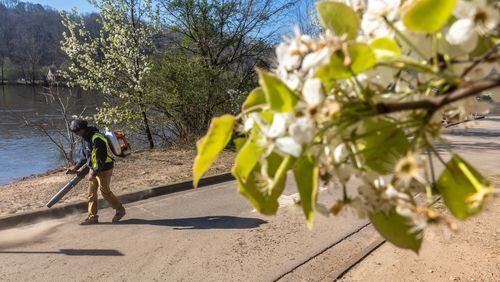Just in time for all those lovely blooms in your yard: A flower freeze is expected in metro Atlanta.
But there are last-minute things you can do to protect petals and leaves from that icy kiss, with the National Weather Service announcing a freeze warning Monday night into Tuesday morning.
Did you already put in summer annual flowers? They won’t like the forecasted temperatures, according to Cole Shiflett, a manager at a Pike Nursery in Suwanee. He says some other good stuff might be at risk of damage. Azaleas that are bubbling up for blooms. Buds on hydrangeas. Really any deciduous shrubs that are on the verge of flowering. Tulips — oh the tulips!
Happier news: The daffodils and those lovely cherry blossoms should be fine, Shiflett says.
Here’s what they are doing at his store to keep the rest of it safe: Putting frost cloths over many of those outside plants at risk, but first giving them a good watering on their root systems. And they aren’t messing around with the basil plants and the flowering impatiens and angelonia; they are just moving those cold wimps inside.
“It’s good to take precautions. It will help the overall health of the plants in the long run,” he said.
The cold arrives at a vulnerable time for some blooms, risking “losing all that energy that the plant has put out,” Shiflett said.
If you have summer annuals but haven’t planted them in the ground yet, put them in the garage if you have one, he says. (Annuals that aren’t tied to the summer, such as pansies and snapdragons, should be OK, he says.)
For other kinds of plants that are at risk and already in the ground, water them really well, then put frost cloths over them, staking down the bottoms of the covers to the ground, he advises.
Pike’s website suggests trying to avoid letting frost cloths touch foliage. Bed sheets or similar fabrics can also be used, but avoid plastic. Other options the company advises: Covering smaller plants with buckets that don’t touch the leaves and bringing potted plants and hanging baskets indoors.
Shiflett says he doesn’t think trees will be at risk from the short and somewhat shallow freeze. And take heart: Temperatures are expected to pop back into the 60s or even low 70s later this week.
About the Author







